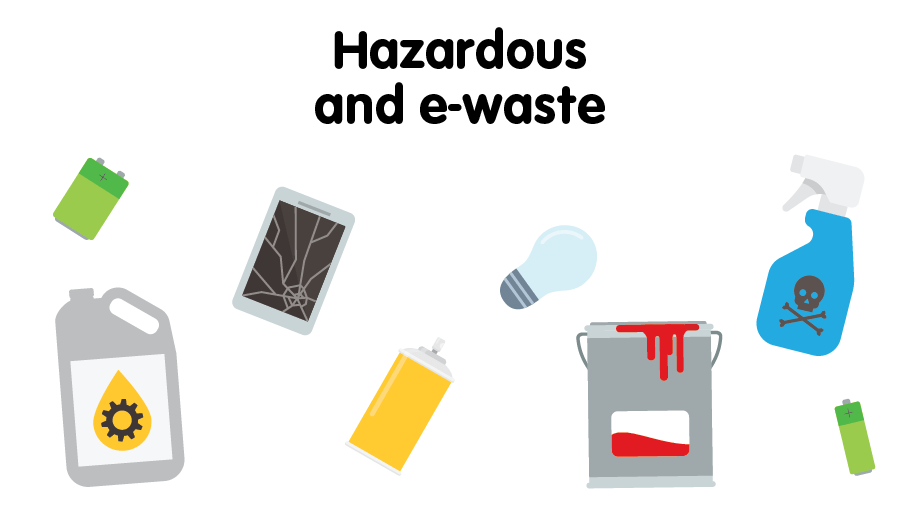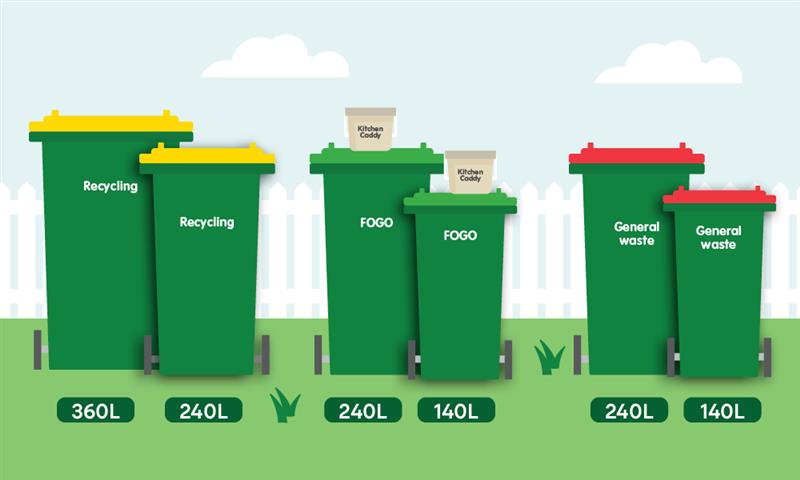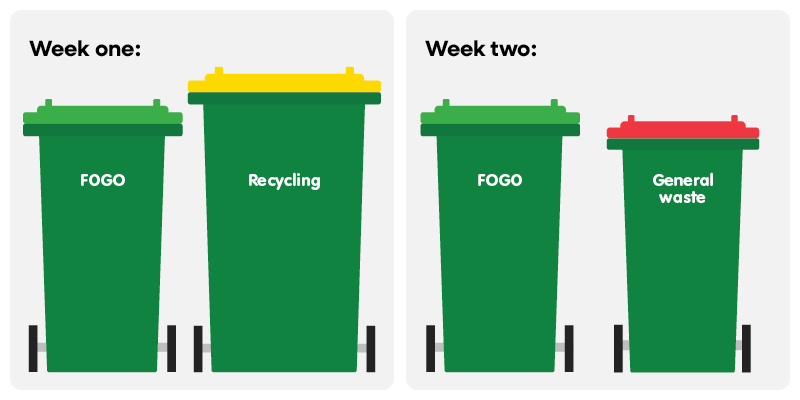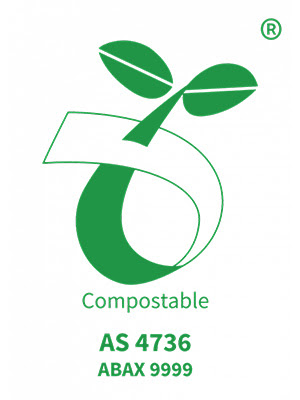In mid-2025, the City of Swan paused the rollout of the three-bin kerbside collection system, including FOGO (Food Organics and Garden Organics), to consult with the community.
Following consultation, Council voted in August 2025 to continue the rollout, with more flexibility for households to choose their bin sizes.
- From October 2025: households already using FOGO can request different bin sizes at no cost. New bins will be delivered from November.
- From early 2026: households not yet on the system will be contacted to choose their bin sizes, with deliveries starting mid-2026.
The FOGO system collects food and garden waste in the lime-green lid bin, turning it into compost instead of sending it to landfill. This supports waste reduction, resource recovery, and a more circular economy.
Food Organics
- Raw or cooked fruit and vegetables (including peels)
- Raw or cooked dairy, meat and seafood scraps (including shells and bones)
- Bread, cereals, grains, pasta
- Coffee grounds and tea bags
- Oils and fats (in small quantities, poured onto a paper towel or cardboard)
- Out-of-date food (unpackaged)
- Please remove any stickers or wax.
Garden Organics
- Lawn clippings
- Garden pruning (under 5cm in diameter)
- Leaves and flowers
- Weeds (including seeding weeds)
- Straw or hay.
Caddy liners
- Certified Australian Standard compostable caddy liners (look for the seedling logo AS 4736).
When in doubt, leave it out.
View a full A-Z list of what goes into which bin.
Prepare for FOGO: Practice your source separation skills and try your hand at the Recycle Right sorting game.
Some plant or natural materials can be mistaken for going in the FOGO bin. These items won’t compost during FOGO processing and should be placed in the red-lid general waste bin, donated, or taken to one of the City’s recycling centres.
Do not put the following in your lime green-lid FOGO bin:
- Animal droppings (pet poo)
- All single-use cups (including compostable) – e.g. coffee cups/takeaway cups
- All food packaging (including compostable)
- Sand or soil.
- “Biodegradable” products like nappies, toothbrushes, feminine hygiene items
- Fruit stickers and wax
- Greaseproof baking paper, aluminium foil, “biodegradable” cling film
- Ash and barbecue charcoal
- Cane baskets, ropes, door mats, coir products, and coconut shells
- Rags, clothing, and textiles
- Terracotta pots and roof tiles
- Large amounts of fertiliser
- Cigarette butts
- Vacuum cleaner contents and dryer lint
- Cork, cellophane, cotton wool
- Leather goods, including shoes
- Building rubble such as bricks and concrete (take these to one of our recycling centres)
- Logs, timber, and branches over 5cm thick (take these to one of our recycling centres).
- Kitty litter.
When in doubt, leave it out.
View a full A-Z list of what goes into which bin.
Remember that hazardous or electronic waste should never be placed in any of your kerbside bins. Please take them to a collection point or the City’s recycling centres.

Rolling out FOGO
We are still using a staged method to roll out FOGO. We will contact households as they become eligible to request their bin configuration.
The City will reimburse ratepayers who have paid for an upsize before we paused the rollout. If you are eligible, we will automatically apply a credit to your rates account, and you will receive an updated interim rates notice in November 2025.
The dates below are an estimate only and are subject to change.
| Stage | Suburbs | Action | Dates |
| One | Ballajura and Cullacabardee | Request changes | October 2025 |
| Bins delivered | November/December 2025 | ||
| Two | Bennett Springs, Beechboro and Kiara | Request changes | October 2025 |
| Bins delivered | January/February 2026 | ||
| Three | Caversham, Lockridge, West Swan and Dayton | Request changes | October 2025 |
| Bins delivered | March/April 2026 | ||
| Four | Guildford, Woodbridge, Bellevue, Bushmead, Koongamia, Hazlemere, South Guildford and parts of Midland | Request changes | Late summer 2026 |
| Bins delivered | Autumn 2026 | ||
| Five | Viveash, Midvale, Swan View, Stratton and parts of Midland, Jane Brook and Middle Swan | Request changes | Early winter 2026 |
| Bins delivered | Late winter 2026 | ||
| Six | Brabham, Henley Brook, parts of Aveley, West Swan and Dayton | Request changes | Spring 2026 |
| Bins delivered | Late spring 2026 | ||
| Seven | Henley Brook, parts of Ellenbrook and Aveley | Request changes | To be advised |
| Bins delivered | To be advised | ||
| Eight | Parts of Ellenbrook, Aveley and The Vines | Request changes | To be advised |
| Bins delivered | To be advised | ||
| Nine | Bullsbrook, Upper Swan, Belhus, Melaleuca, parts of Ellenbrook, The Vines and Aveley | Request changes | To be advised |
| Bins delivered | To be advised | ||
| 10 | Brigadoon, Baskerville, Millendon, Herne Hill, Red Hill, parts of Middle Swan and Jane Brook | Request changes | To be advised |
| Bins delivered | To be advised | ||
| 11 | Malaga | Request changes | To be advised |
| Bins delivered | To be advised |
Choosing your bin size
Under the updated rollout, households can choose:
- 140L or 240L red lid general waste bin
- 140L or 240L lime-green lid FOGO bin
- 240L or 360L yellow lid recycling bin.
To help residents decide, here are some examples of popular combinations:
- Small household or low waste producers – 140L general waste, 140L FOGO, 240L recycling
- Gardening enthusiasts – 140L general waste, 240L FOGO, 360L recycling
- Large family with young children and a moderate/large-sized backyard – 240L general waste, 240L FOGO, 360L recycling.
If you do not tell us if you would like different sizes, we will deliver the standard system which is a 140L red-lid general waste bin, 240L lime-green FOGO bin and a 360L yellow-lid recycling bin.

Frequently asked questions
Yes, they will.
You will keep your yellow-lid recycling bin. You will receive a 140L red-lid general waste bin and your 240L dark green-lid bin will be replaced with a new lime green FOGO lid.
In the new three-bin kerbside collection system, you’ll have 70L of extra waste capacity for materials each week.
Our most recent audit by the Department of Environment and Water Regulation shows that of the materials placed in the general waste bin:
- 50 per cent is food and garden waste
- 17 per cent is recyclable
- 7 per cent is hazardous waste that does not belong in a kerbside bin
- Only 26 per cent is actual general waste.
The new three-bin kerbside collection system should suit most average households if used correctly.
Once FOGO rolls out in your area, you will place two bins on your verge each week.
The lime green-lid FOGO bin will be collected weekly. The yellow-lid recycling bin and red-lid general waste bin will be collected on alternate fortnights.

FOGO waste is taken to a processing facility. The waste will be checked for contamination and go through a rigorous composting process.
The compost can then be used for farms, parks, gardens and land rehabilitation projects.
You will get a kitchen caddy during the FOGO rollout when we replace your current green-lid with a lime green FOGO lid. Empty your caddy into your FOGO bin every few days to avoid odours.
You can collect meat scraps separately and store them in the freezer until bin collection day.
You will receive two rolls of compostable caddy liners with your new kitchen caddy. Each roll has 75 liners.
Every 12 months, you are eligible for two more rolls of liners free of charge, on proof of residency.
You can get more compostable bags from:
- Annual caddy liners can be collected from the City’s Beechboro or Ballajura Library or the Recycling Centre – Malaga. Please bring ID showing your address.
- Supermarkets: The bags must be certified compostable (AS 4736). Check if your local supermarket uses compostable produce bags in the fruit and vegetable section. Look out for the logo below.
“Biodegradable” or “recycled plastic” bags are not the same as compostable bags. These will break down into microplastics and contaminate the FOGO composting system.
You can also line the caddy with brown paper bags, paper towels or paper serviettes. Some people choose to go without a liner and wash their caddies in their dishwasher.

To minimise odours from your organic waste, the lime green lid FOGO bin is collected weekly.
You can minimise odours in between collections by:
- Emptying your kitchen caddy regularly
- Keeping your kitchen caddy clean – it is dishwasher-safe
- Freezing your meat scraps until bin collection day
- Using the supplied compostable kitchen caddy liners
- Layering your lime green lid FOGO bin with dry materials such as leaves or shredded paper
- Storing your lime green lid FOGO bin in a cool, shady area where possible
- Washing your bins a few times a year with detergent and a broom.
Odours in your red-lid general waste bin from items such as nappies, feminine hygiene products and biomedical waste can be reduced by:
- Emptying nappy contents into the toilet before placing the nappy in your red-lid general waste bin
- Wrapping items in newspaper or reusing food packaging such as plastic bread bags
- Using reusable sanitary products and cloth nappies.
You can prevent pests such as birds and flies from becoming a nuisance by:
- Tying your rubbish bags tightly to stop flies getting in
- Ensuring that the lid is securely closed.
- Keeping your bin clean with bi-carb soda, detergent, anti-bacterial spray or eucalyptus or tea tree oil to help repel flies.
- Hosing down your bin regularly in warmer months when odour can be an issue.
Used nappies (compostable, biodegradable, or conventional) belong in the red-lid general waste bin.
Human waste can’t be processed into compost that meets Australian standards.
Australian-based studies, conducted in summer, have found that the odour from kerbside bins containing nappies is primarily influenced by whether the nappies are wrapped in plastic and if the bin is in the sun or shade. After two weeks, the odour was no worse than regular garbage bins at the end of a week, regardless of the number of nappies in the bin.
To minimise any smells from used nappies:
- Empty nappy contents into the toilet before placing the nappy in your red-lid general waste bin
- Wrap nappies in a plastic nappy bag or re-use food packaging such as a plastic bread bag
- Store your general waste bin in the shade
- Report cracked or damaged kerbside bins to the City for replacement or repair. Call (08) 9267 9267 or email us at swan@swan.wa.gov.au
- Consider using odour-neutralising products in your bin such as bicarbonate of soda
- Register your expression of interest to attend a free modern cloth nappy workshop in 2025, and receive a free trial kit. Reusable cloth nappies are widely available and are a popular alternative to disposables. Visit Clean Cloth Nappies for more information.
The great news is that the FOGO system handles organic items that can’t be composted at home. You can now put them in your lime green-lid FOGO bin.

Meet the FOGO team
You can find the FOGO team at:
- Midland Markets at Weeip Park, Saturday, March 14, 2026 from 4.30-8.30pm.
- Altone Comes Alive, Saturday, March 21, 2026 from 3-7.30pm.
